WeChat’s Mini Programs are the latest method of social selling in China and every company needs to know what they are and how they work. By Lionel Sim and Tom Pattinson
What are Mini Programs?
Launched in January 2017, WeChat’s Mini Programs (MPs) provide an important link for user and businesses, by providing an accessible and powerful way to consume products and services through the WeChat platform. WeChat contains a variety of key features that provide personalised services such as e-commerce and mobile payments linked to social media.
WeChat ecosystem
MPs are mobile apps built for and within the WeChat platform. There are MPs for things like travel, games, food delivery, shopping, event sales and much more and they are often found through online sharing and offline QR-code scanning.

Interface of WeChat MP with services Video depicting the social applications of WeChat MPs
MPs that go viral are typically those that have an element of gamification, and use reward-based incentives as a tool to quickly scale the product.

Google China has created a viral sketching game in MP Game
Selling socially
Whilst e-commerce (especially cross border commerce) has become a hot topic among global brands entering the China market, it is ‘social commerce’ that is increasingly the new trend in the market. Gradually, more and more offline purchases are being influenced by recommendations made through socially driven, highly interactive online experiences.
This integration acts to boost the online buying and selling cycle and has given birth to an ecosystem in which commerce is embedded into social interactions and social networks have turned into multi-dimensional experience platforms.
Social networks’ potential to generate viral activity, combined with the trust these networks generate, is the key driver in motivating users to purchase products and services. It is this herd mentality, or FOMO (Fear of Missing Out), that feeds the development of particular trends and fashions.
More and more offline purchases are being influenced by recommendations made through socially driven, highly interactive online experiences.
Compared to traditional mobile websites the MPs provide a simpler user experience, increasing accessibility both online and offline. For example, scanning a QR code in a store can provide a discount code or offer from the MP.
Mobile payments are seamlessly integrated via WeChat pay, meaning no third party payment gateways are needed, which reduces fees and increases speed. And MPs have many more traffic sources including:
- MPs Nearby Feature
- Sharing to WeChat Friends
- Sharing to WeChat Groups
- WeChat MPs linking to Moment Ads
- Scanning Mini Program QR Code
- Official Account Article Syndication
- MPs linking to Official Accounts
- WeChat MPs linked with e-coupons
- WeChat Pay linking to MPs
Recently, Chinese eCommerce brands like JD.com, Meituan Dianping and Pinduoduo have been implementing even more innovative features within the MPs.
JD.com, a pioneer in social e-commerce in China. has been actively using and deploying WeChat MPs to facilitate social group buying, and have garnered an active user base in Tier 3 and Tier 4 Chinese cities through marketing incentives and education. As such activity develops the understanding Chinese users already have on how to purchase through a MP, it also better allows global brands to target their Chinese consumers.
The prevalence of social commerce, at significant scale, via a decentralised platform like WeChat, enables MPs to be an important element in the ecosystem. As this area grows, the strong and dynamic interactions between users and businesses that MPs encourage could encourage global brands to build their brand awareness and sell their products and services more creatively to Chinese consumers.
The benefits of a WeChat Mini Program presence
Access to a large user base reaching deep into new markets in China
WeChat has more than 1 billion users globally. Luxury brands on WeChat are able to reach that audience and effectively showcase their brand identity to potential Chinese customers in smaller cities, which are the future luxury hubs in China.
Clear conversion analytics and tracking
Luxury brands that engage in WeChat advertising are able to clearly track ad conversion metrics such as profile views, the click-through rate and ad conversion rate. Brands are able to utilise this information to craft effective digital marketing strategies for seasonal promotional campaigns.
Online-to-offline integrated marketing
WeChat has many features and functionalities such as WeChat official accounts, Moments Ads and Mini Programs. All these online interactions are able to be integrated into an offline environment. A luxury shopper can preview product information online through a MP, book a VIP appointment online or be invited to preview exclusive products and services offline in a speciality store.
Social interactivity within WeChat
WeChat’s biggest strength is social. Hence, luxury brands can generate a personal and interactive relationship with users through the use of social and gamified marketing tools. For luxury customers, the ability to connect to brands at an intimate level is critical. This is especially true when consumers are accessing the information digitally or through social recommendations from their friends and peers. The perceived affiliation with luxury brands strengthens overall brand engagement and loyalty.
Full control of brand identity
Luxury brands have full autonomy and flexibility in building their own brand identity on WeChat. They are empowered with WeChat’s tools to create creative and interactive content to engage luxury consumers.
WeChat features such as Brand Zone enable luxury brands to effectively illustrate their brand’s story and allows users to share exclusive content with their social networks. Other functionalities such as Digital Concierge allow consumers to directly contact brands if they have inquiries or need assistance.
Luxury brands such as Dior and Tod’s have all built up their own branded WeChat stores with an integrated suite of buying and support services. Hermes also set up a support channel on a MP to assist before and after sales support. Customers could also pre-book an appointment to view favourite items.
Five types of social selling
Limited time offer
MPs that deploys flash sales or ‘Limited Time Offers’ generate viral interest to attract consumers. For consumers, the ability to obtain a good deal is psychologically addictive and spurs strong consumer buying desire. Such strategies will often attract a large and targeted audience, generating high volumes of brand awareness and marketing for the products being sold.
For consumers, the ability to obtain a good deal is psychologically addictive and spurs strong consumer buying desire.
This strategy works best for those luxury and premium brands that effectively display their brand identity in the MP.
A good example of this was a partnership between social influencer Mr. Bags and handbag brand Tod’s. Within six minutes of launching the WeChat MP shop, more than 300 of the US $5,000 bags were sold.
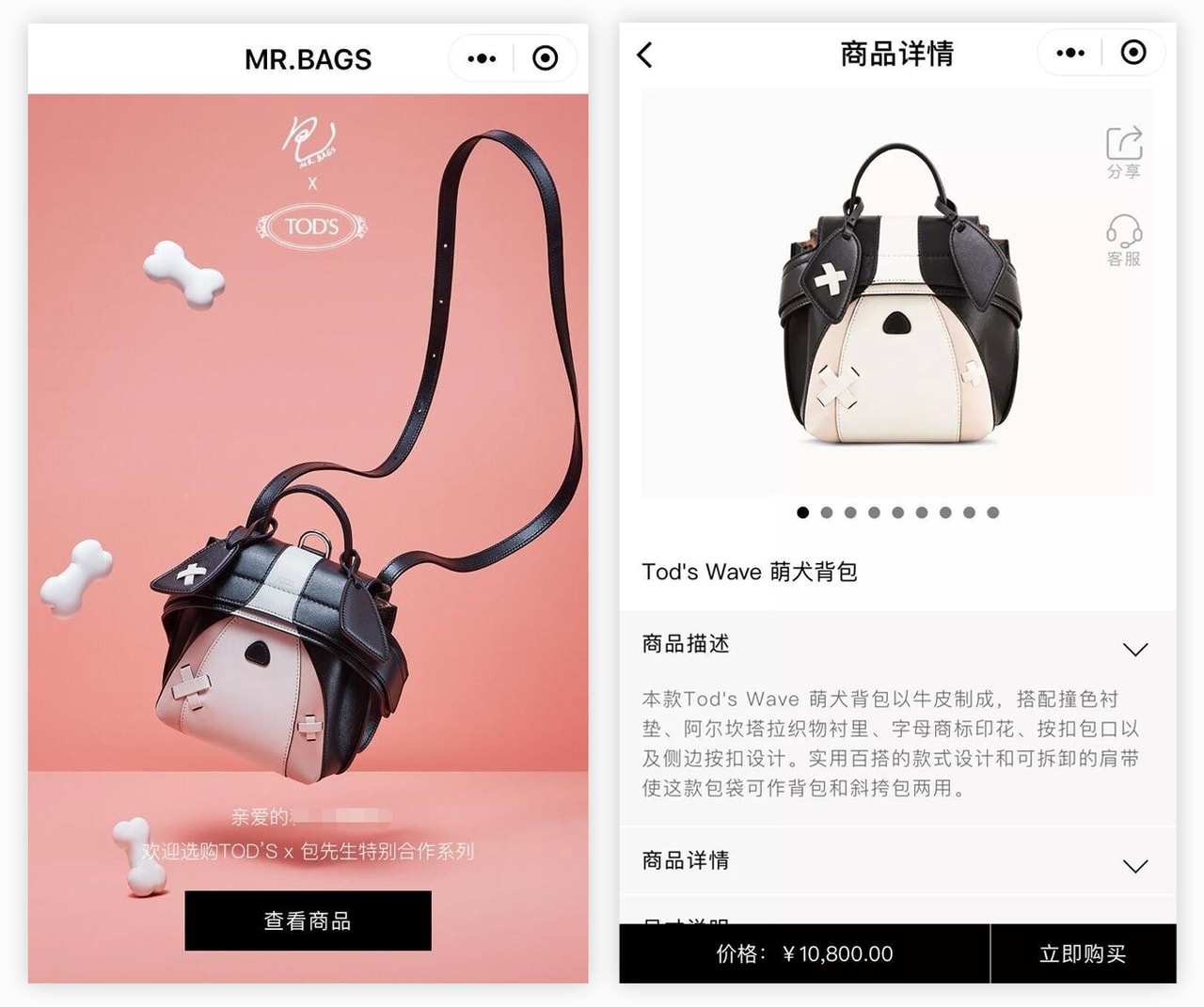
Mr. Bags partnership with Tod’s to launch on MP
Price sensitive MPs
Relying on network effects to bring traffic and awareness to the MP, brands will offer users a significant discount if they successfully share or refer to their friends. This is followed up with further rewards such as discounts and complimentary gifts if the recommended friend then purchases a product.
Starbucks successfully implemented this model of social selling with a promotion in which a customer who bought a Starbucks coffee through the MP could pass on a limited number of discount e-coupons to friends.
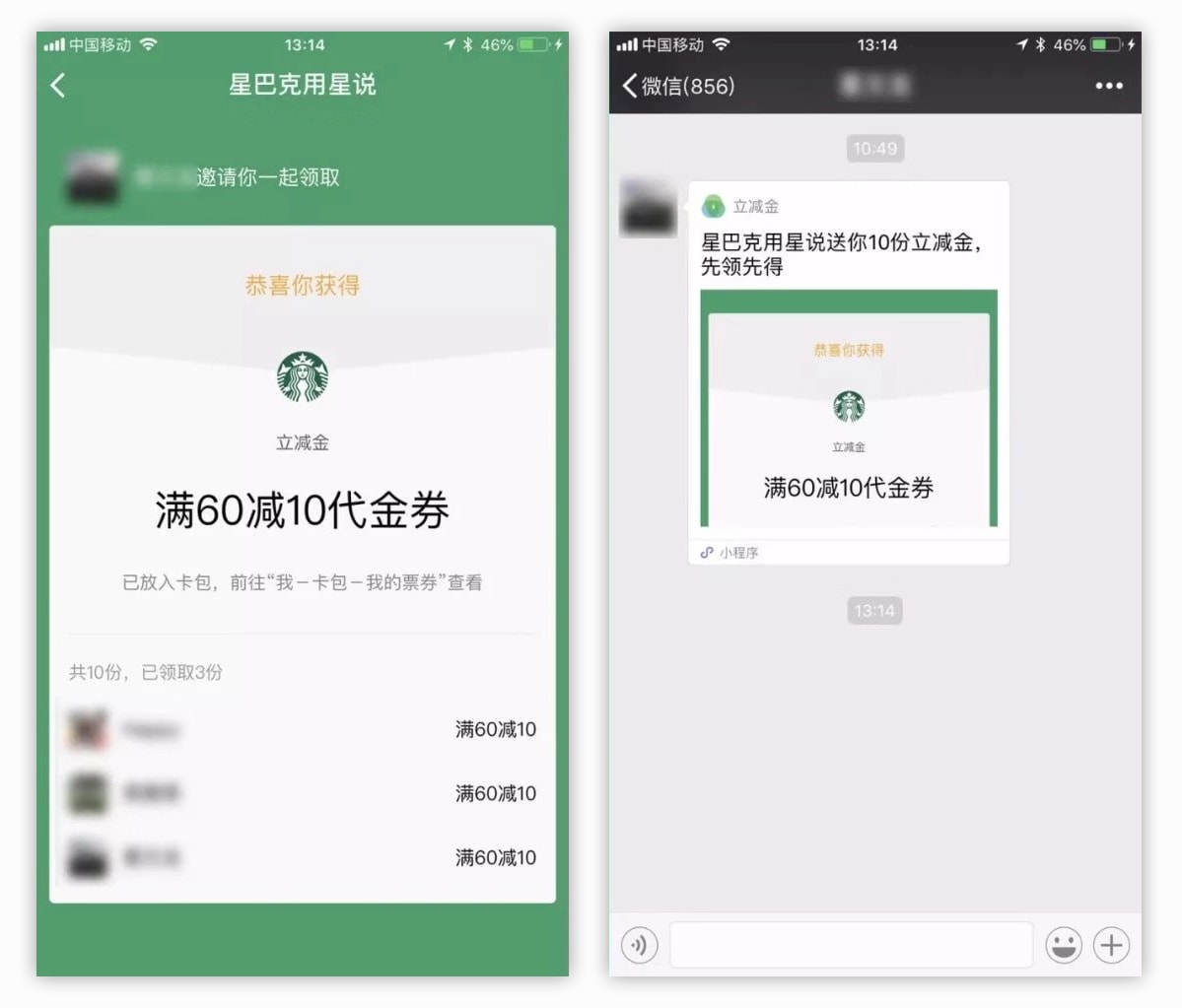
Starbucks China discounted offers MP
Social group buying MPs
Another strategy sees brands invite groups of friends to buy in bulk volume in order to obtain a discounted price of complimentary items on top of their purchase. Users share the MP via their WeChat Moments, WeChat Friend network and WeChat Groups to garner interest amongst their network.
This type of social selling allows large amounts of users to share offers, and by putting the brand in front of a large audience can create impulse purchases.
Pinduoduo is a master of social group buying and is very successful in leveraging the power of social recommendations to acquire users and offer products at a significantly lower price. Their target audience is predominantly price sensitive clients and this form of MP works best for low to mid-priced products and services.

Social group buying is becoming more popular
Reward points MPs
Some MPs allow users to acquire membership points when they make purchases. As with many loyalty programmes, these points can then be used to get further discounts and exclusive offers. Carrefour China recently launched a reward points programme that promoted the latest assortment of fresh produce.
It is common to see Chinese consumers scanning QR codes in store, then purchasing the item and redeeming the reward points that they have. This “Scan, Redeem and Purchase” behaviour has drastically reduced queues in the supermarket and increased overall user experience.
E-Coupon/Card MPs
The ability to integrate coupons or gift cards to MPs is useful for user acquisition, engagement and loyalty. When the JD.com group buying MP was first launched, they introduced more than 50 kinds of E-Coupons where users would be given a 100 RMB coupon if they helped acquire four new users.
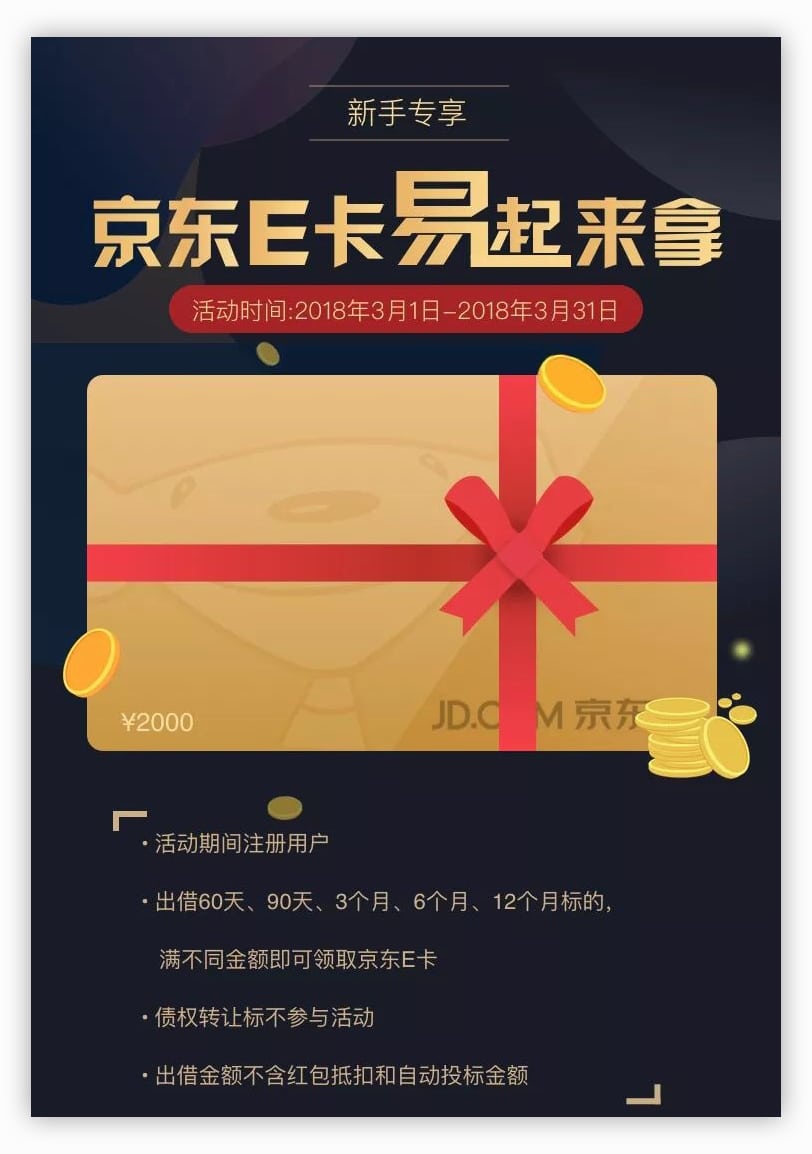
JD.com launching e-coupons within their MP
Shifting trends and psychology of Chinese consumers
Growing individualism means personalisation is key
Chinese consumers are increasingly prioritising brands that offer experiential products and express individuality, so MPs that allow the personalisation of products and services are popular. Through MPs such as Digital Concierge and other Premium VIP services, brands can offer personalised products and services that cater for this growing desire for exclusivity and autonomy.
Longchamp’s MP allows the personalisation of bags, whilst the Sergio Rossi MP allows shoppers to personalise the heels on their shoes according to their size and colour preferences.
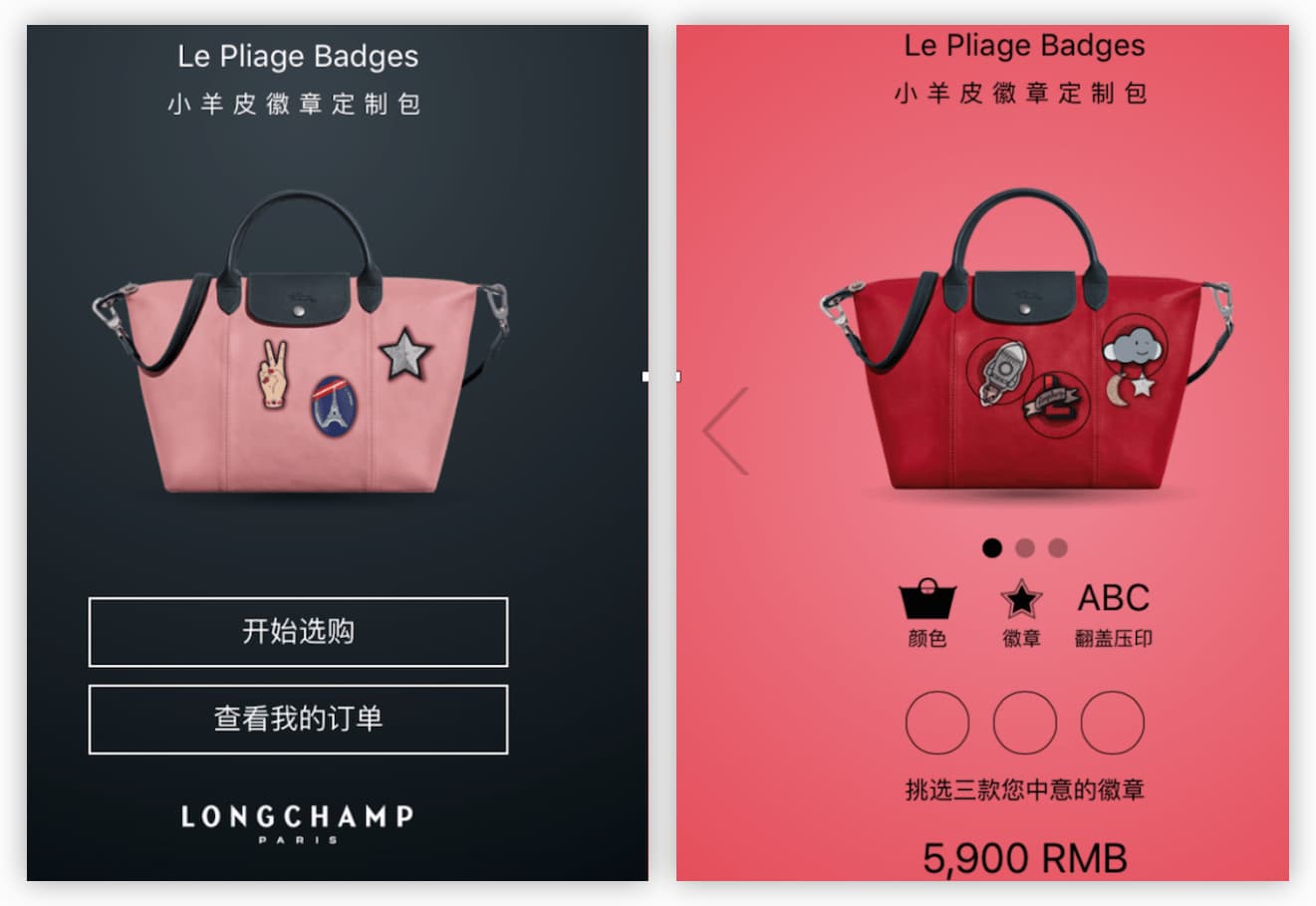
Longchamp’s MP allows bags personalisation and Sergio Rossi’s allows customisation of heels.
Scarcity of time means elevating convenience
With the development of ride-hailing, bike-sharing and food delivery services, Chinese consumers have both saved time and become instantly available to a range of products and service offerings.
The fast loading time and clear navigation features of MPs allows users to quickly access products and services. Mobike’s MP allows users to quickly detect the nearest available bike through the MP’s location features. Similarly, Tesla’s MP facilitates user access to the nearest electric charging station.
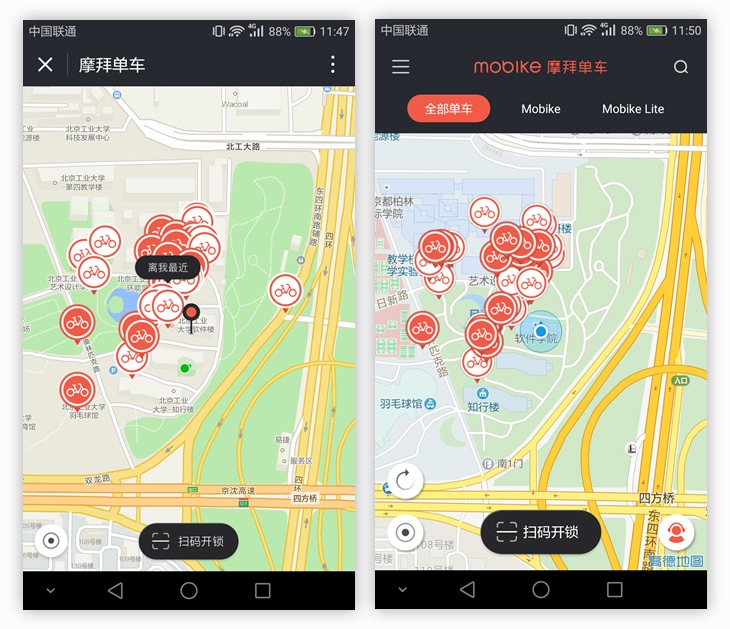
Mobike Mini Program allows users to locate the nearest available bike
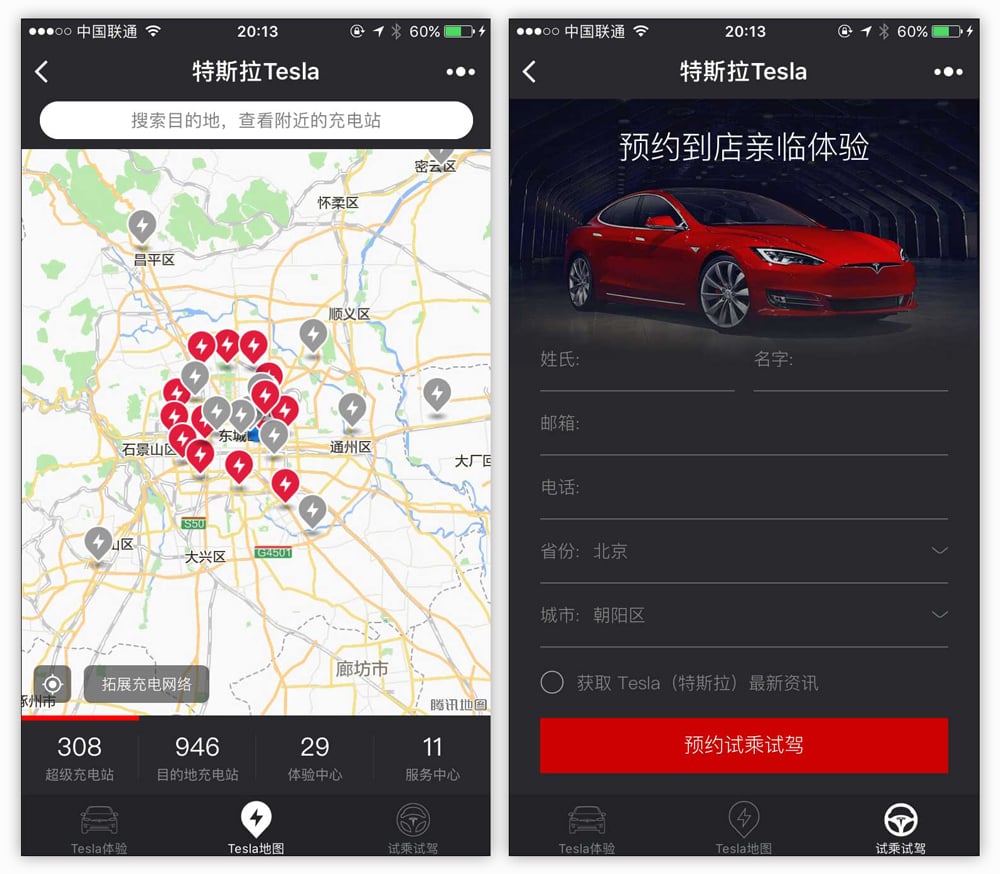
Tesla Mini Program allows drivers to locate the nearest charging station
Increasing social stresses means increasing gamification
Higher levels of social stress are driving China’s youngest generations to demand more informal interactions in both the virtual and physical world. The gaming aspect of MPs allows users to interact with their friends in a fun way whilst also granting them increased access to products and services through immersive social experiences.
The viral MP game “Tiao Yi Tiao”, in which users gain points by jumping on bricks, amassed 100 million users within the first two weeks of its launch in December 2017. Nike was the first to place in game ads, which generated significant brand awareness for their Nike React campaign.

Nike Ad Placement in WeChat Mini Game – Tiao Yi Tiao (Jump)
Global shopper mind set means providing a global marketplace
Chinese consumers are now global shoppers and are increasingly fully independent travellers who prefer to plan trips themselves, which – potentially – could include recommendations via WeChat. MPs that allow Chinese consumers to shop globally and buy products and services overseas easily are increasingly important.
A good example is the DFS Hong Kong e-shop MP; users can use this to shop while they are in China and then pick up from outlets in Hong Kong with added value and convenience.
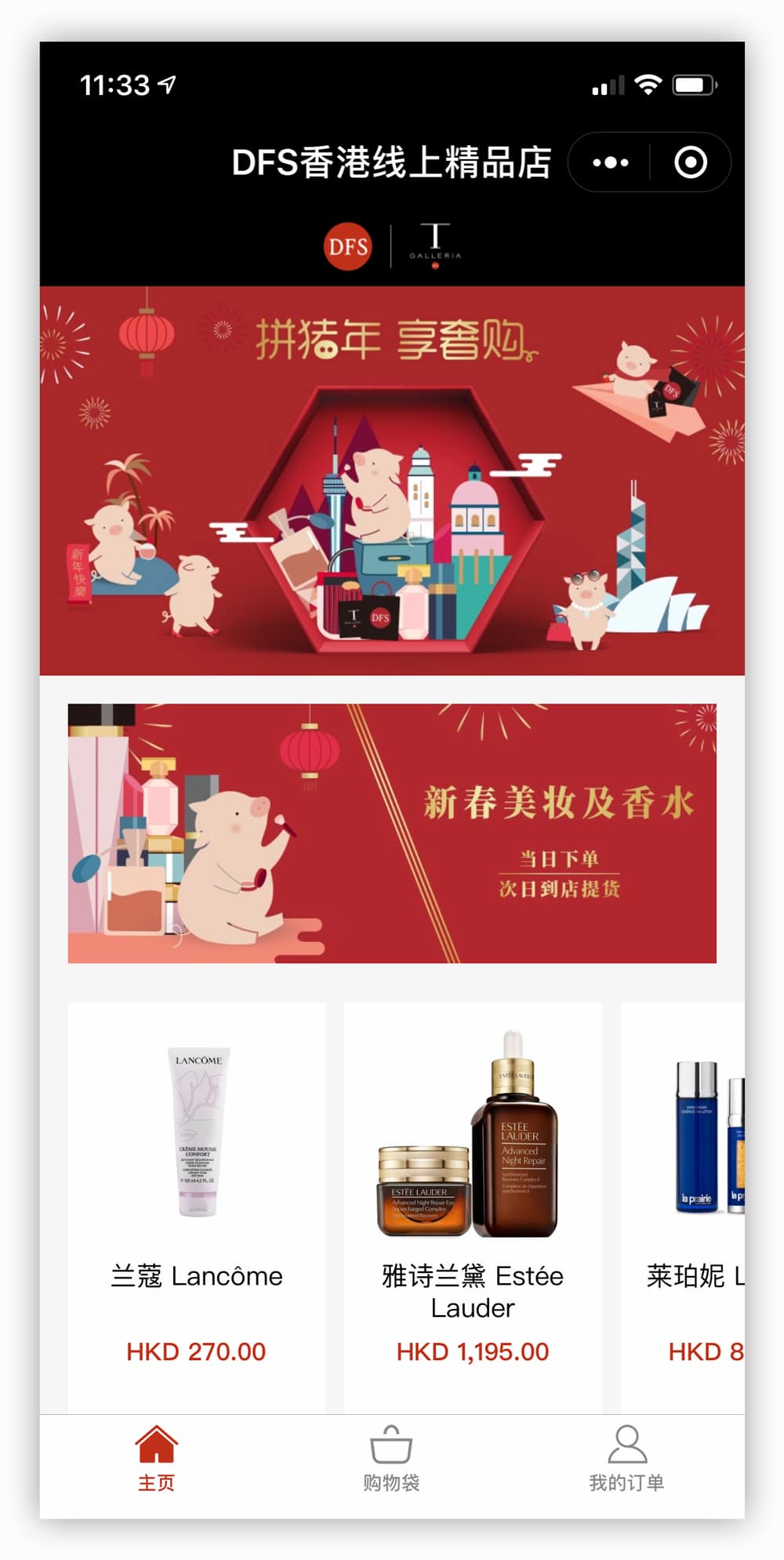
DFS Mini Program provides a global marketplace for Chinese shoppers
Advantages of using Mini Programs
User Perspective:
- Users do not need to install (or uninstall) a MP like a native app.
- Users can access a variety of functional services such as watching videos and gaming in a MP.
- Users can save data storage space in their phone as each MP takes up only a maximum of 8MB space.
Brand Perspective:
- Brands can target and leverage a massive user base of more than a billion users.
- The development lifecycle of MP is much faster and easier to prototype and iterate than an app.
- It’s easier to market, discover and promote a MP through the WeChat ecosystem using tools such as WeChat Moment Ads, WeChat Official Accounts and WeChat Pay.
- It offers the ability to dynamically connect online and offline environment (O2O) through QR code activation.
- It can assist businesses in the process of digital transformation by offering quick to start and easier prototyping of digital ecosystems.


